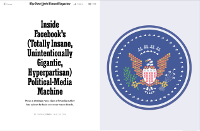
Open your Facebook feed. What do you see? […] Facebook, in the years leading up to this election, hasn’t just become nearly ubiquitous among American internet users; it has centralized online news consumption in an unprecedented way. […]
And unlike traditional media organizations, which have spent years trying to figure out how to lure readers out of the Facebook ecosystem and onto their sites, these new publishers are happy to live inside the world that Facebook has created. Their pages are accommodated but not actively courted by the company and are not a major part of its public messaging about media. But they are, perhaps, the purest expression of Facebook’s design and of the incentives coded into its algorithm — a system that has already reshaped the web and has now inherited, for better or for worse, a great deal of America’s political discourse. […]
For now, the network hums along, mostly beneath the surface. A post from a Liberty Alliance page might find its way in front of a left-leaning user who might disagree with it or find it offensive, and who might choose to engage with the friend who posted it directly. But otherwise, such news exists primarily within the feeds of the already converted, its authorship obscured, its provenance unclear, its veracity questionable. It’s an environment that’s at best indifferent and at worst hostile to traditional media brands; but for this new breed of page operator, it’s mostly upside. In front of largely hidden and utterly sympathetic audiences, incredible narratives can take shape, before emerging, mostly formed, into the national discourse. […]

